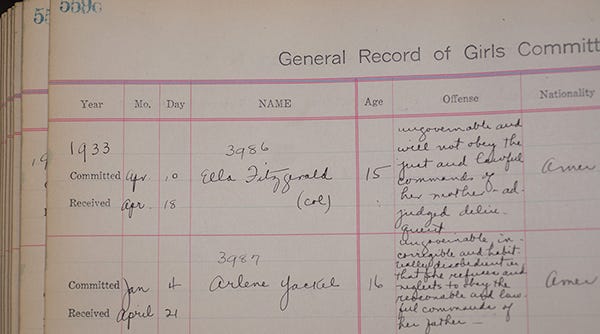Above: the “general record” book of the New York Training School for Girls (Hudson, New York). Even though this image is included in, among other places, Leslie Woodhead & Reggie Nadelson’s excellent documentary Ella Fitzgerald: Just One of Those Things (2019), I never noticed that it plainly states that Ella’s mother was still alive at the moment when she entered the reform school.
Revising Ella, part 1
The episode of Revisionist History discussed below can be heard here.
Judith Tick’s long-awaited biography, Becoming Ella Fitzgerald, is finally coming out this Fall. This is very exciting, especially since I am the number one guy who has been doing all that “long awaiting.” I hadn’t planned on writing about the new book until closer to publication, but I was motivated to do this column (if that’s what it is) after hearing the latest episode of one of my favorite podcasts, Malcolm Gladwell’s Revisionist History.
This episode is a dialog between Mr. Gladwell and Ben Naddaff-Hafrey, the host-producer of another excellent show, The Last Archive, also presented by Mr. Gladwell’s company, Pushkin Productions. Mr. Naddaff-Hafrey recently took over The Last Archive from another of my favorite writers, Jill Lepore, and he’s doing a swell job - I am planning to write about his thoughtful episode about the idiosyncratic composer Raymond Scott.
Mr. Naddaff-Hafrey has unearthed a fascinating correlation between what I would have thought were two completely unrelated topics: social science and psychiatry and the rather mysterious early life of Ella Fitzgerald. Please listen to the episode for the full details, but suffice it to say that the Bucharest-born psychologist, Jacob Levy Moreno (1889 – 1974) developed an elaborate theory about the mass behavior of groups and crowds and populations. (Ben explains it better than I ever could.)
As it happened, Moreno conducted a fundamental part of an enormous study at the New York Training School for Girls - “Training School” being a euphemistic name for a reform school - in Hudson, New York, between 1932 and 1934. The historical record, which is also discussed in this recent story from The Hudson New York Times Union, also informs us that Ella Fitzgerald roughly spent a year there, from April 16, 1933 (a week before she would turn 16) to the Spring of 1934. The record isn’t clear on how she left, and there’s speculation that, like some of the other girls, she may have simply escaped, since she had been sentenced for from three to five years.
I’m very delighted at all this new research. Mr. Naddaff-Hafrey is the first to connect all these various threads, which show that Moreno was conducting his study at the precise period when Fitzgerald was an inmate at the school, and Ms. Tick has given us lots of new info about Fitzgerald’s early life. Mr. Naddaff-Hafrey also plausibly shows that the 16-year-old Fitzgerald is actually mentioned in the study itself, but, again, you should listen to the episode for those details.
Nearly every account of Fitzgerald’s life tells us that the 15-year-old future singer kind of fell apart after the death of her mother in 1932. Yet Ms. Tick proves conclusively that the young Ella somehow ran off the rails in a manner that caused local authorities to detain her in a reform school, effectively a prison for juvenile delinquents, all while Ella’s mother was still alive. Ms. Tick establishes that Tempie Fitzcorrie, as she was identified on her death certificate, died at age 39 from a cerebral hemorrhage on October 10, 1934. This is several months after Ella was back in Yonkers and only a month or so before the legendary, world-changing Apollo Theater amateur night contest that catapulted her career.
So kudos to Judith Tick for this book, about which you will surely hear a lot more when it’s published in the fall. And also to Malcolm Gladwell and Ben Naddaff-Hafrey for an entirely different perspective on what has to be the most mysterious incident in the life of Ella Fitzgerald. And no, I don’t blame them for making the usual mistake of following Ella’s own account, in which she says her mother died when she was 15. I have written about Ella’s life a thousand times and I also always got it wrong. (Mr. Naddaff-Hafrey also acknowledges the copious research of Nina Bernstein, as well as Stuart Nicolson’s Ella Fitzgerald: A Biography of the First Lady of Jazz, published in 1994 when the great lady was still with us.)
There’s another issue worth discussing both in Ms. Tick’s book and the Revisionist History episode, but I’ll get into that tomorrow.



I'm very excited about Judith Tick's book too. And I made that same mistake about her mother in my book.
Let the truth finally be known about Ella.